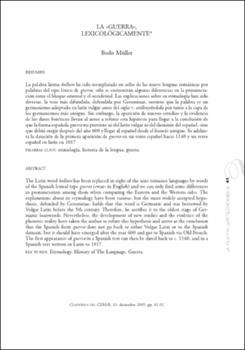La «guerra» lexicológicamente
Autor
Müller, BodoFecha
2005Resumen
The Latin word bellum has been replaced in eight of the nine romance languages by words
of the Spanish lexical type guerra («war» in English) and we can only find some differences
in pronunciation among them when comparing the Eastern and the Western sides. The
explanations about its etymology have been various, but the most widely accepted hypothesis, defended by Corominas, holds that this word is Germanic and was borrowed by
Vulgar Latin before the 5th century. Therefore, he ascribes it to the oldest stage of Germanic loanwords. Nevertheless, the development of new studies and the evidence of the
phonetic reality have taken the author to refute this hypothesis and arrive at the conclusion
that the Spanish form guerra does not go back to either Vulgar Latin or to the Spanish
domain, but it should have emerged after the year 600 and got to Spanish via Old French.
The first appearance of guerra in a Spanish text can then be dated back to c. 1140, and in a
Spanish text written in Latin to 1017. La palabra latina bellum ha sido reemplazada en ocho de las nueve lenguas románicas por
palabras del tipo léxico de guerra, sólo se encuentran algunas diferencias en la pronunciación entre el bloque oriental y el occidental. Las explicaciones sobre su etimología han sido
diversas, la tesis más difundida, defendida por Corominas, sostiene que la palabra es un
germanismo adoptado en latín vulgar antes del siglo V, atribuyéndola por tanto a la capa de
los germanismos más antigua. Sin embargo, la aparición de nuevos estudios y la evidencia
de los datos fonéticos llevan al autor a refutar esta hipótesis para llegar a la conclusión de
que la forma española guerra no proviene ni del latín vulgar ni del dominio del español, sino
que debió surgir después del año 600 y llegar al español desde el francés antiguo. Se adelanta la datación de la primera aparición de guerra en un texto español hacia 1140 y un texto
español en latín en 1017.





